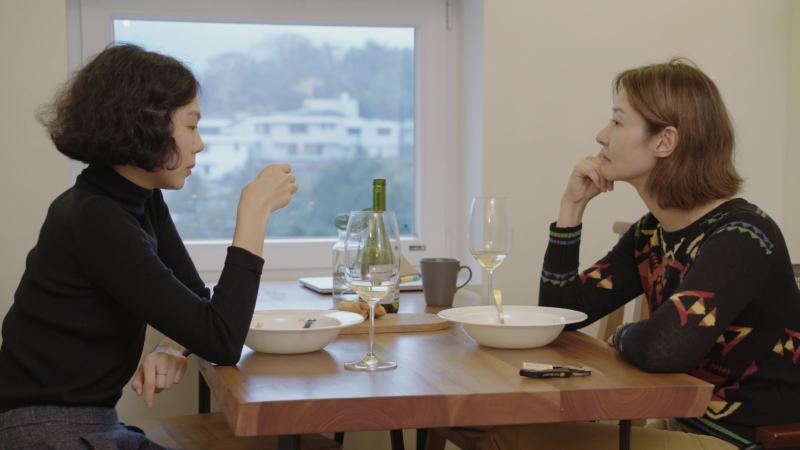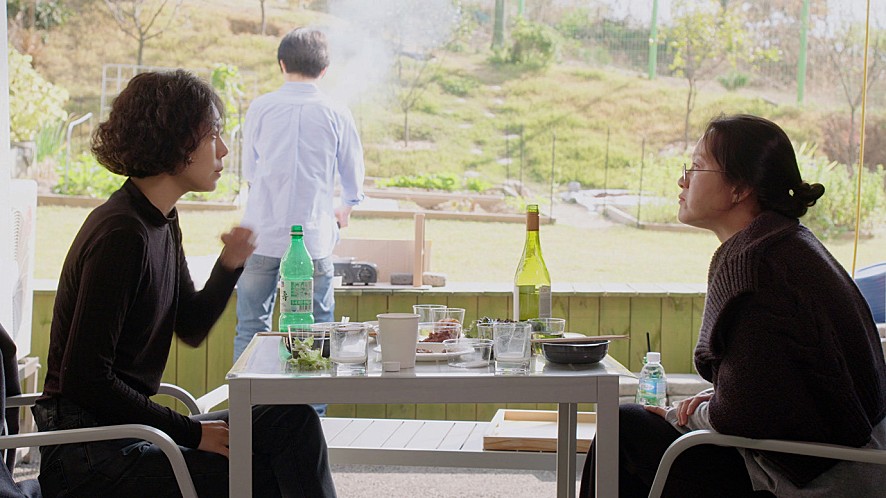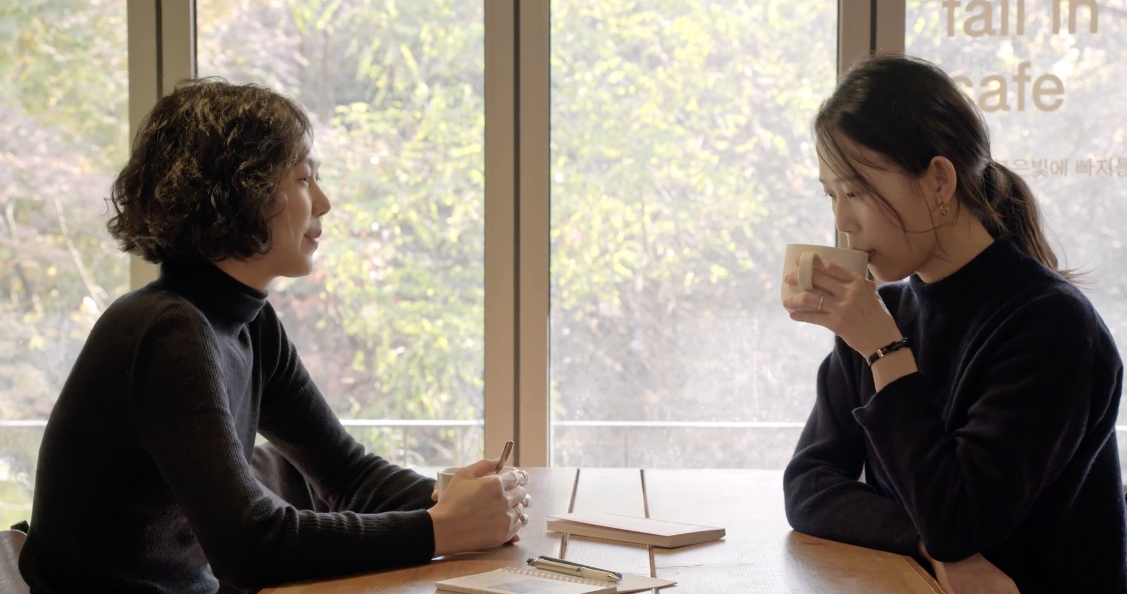The Woman Who Ran review - toxic male alert | reviews, news & interviews
The Woman Who Ran review - toxic male alert
The Woman Who Ran review - toxic male alert
Hong Sang-soo's wry minimalist comedy eavesdrops on women discussing men

The dramatic developments in The Woman Who Ran, the 24th film written and directed by Hong Sang-soo since 1996, are mild to say the least.
The film consists of three short sections in which Gam-hee converses with a different fellow middle- or lower-middle-class woman, each of whom has a disconcerting story to tell about a relationship with a man. Taking advantage of her husband’s rare absence on a business trip, she visits separately her old friends Young-soon (Seo Young-hwa) and Su-young (Song seon-mi); in the third part, she chances on a former acquaintance, Woo-jin (Kim Sae-byuk), who apologises to Gam-hee without great conviction, for having run off with Mr. Jung years before.
The placid, kindly Young-soon is divorced and has moved to the outskirts of the city. The only one of these female characters who isn't bored, Young-soon tends her garden under the lee of a mountain. She has seemingly given up on men to live with a boyish woman roommate who cooks for them. The roommate's barbecuing of meat satisfies their guest Gam-hee's admitted craving for it, a Pinteresque touch that iterates how the unfussy metteur-en-scène Hong thinks more like a dramatist than a filmmaker. During Gam-hee’s visit, a new neighbour calls on Young-soon to demand she stop feeding the local cats since his wife is scared of them. Young-soon, supported by her roommate, reasonably refuses to comply with his wish. The first of the three toxic males Gam-hee meets on her holiday from her hubby, he issues a threat as he leaves. One hungry cat shows up to demonstrate dignity to him. (Pictured below: Kim Min-hee and Seo Young-hwa.)
 As Gam-hee talks across a table with each of the women, she tells them consecutively that she has been happily married for five years, but her mechanical repetition of her words suggests she is trying to convince herself. She can’t give a straight answer to the question “Do you love your husband?” when Su-Young asks her; it’s also strongly implied he’s abnormally possessive (Young-soon, for her part, couldn’t stand seeing her husband every day).
As Gam-hee talks across a table with each of the women, she tells them consecutively that she has been happily married for five years, but her mechanical repetition of her words suggests she is trying to convince herself. She can’t give a straight answer to the question “Do you love your husband?” when Su-Young asks her; it’s also strongly implied he’s abnormally possessive (Young-soon, for her part, couldn’t stand seeing her husband every day).
When Gam-hee visits Su-young – a stylish, jaded pilates-instructor – she learns from her that she’s been drinking at a local bar. The first time she was there, she met a married (albeit separated) man she likes and who lives in her building. On another occasion, she met a poet she drunkenly went to bed with once. He has taken to stalking her and she to humiliating him for his need. Gam-hee watches Su-young sneering at him – toxic male number two – on her intercom video. If The Woman Who Ran is the most vaguely feminist of Hong’s recent films, it doesn’t sanctify women as spiteful as Su-young or as ruthless as Woo-jin.
The latter has become the proprietor of a small independent cinema where Gam-hee goes to a screening, hoping – consciously or not –she'll encounter Mr. Jung, now Woo-jin’s husband and a successful author. First, though, she runs into Woo-jin, who invites her to her back-office and complains at length about Mr. Jung’s having sold out as a pontificating, insincere TV pundit – in short, a bore.
Gam-hee echoes her sentiments when she chances on Mr. Jung having a smoke before he gives a talk to his fans in the cinema basement. Gam-hee may not have resolved her feelings about him, but she gets a glimpse of how worse things could have been for her had she ended up with him. Mr. Jung is played by the roué-ish Kwon Hae-hyo, who excelled as the adulterous intellectual writer and publisher opposite Kim (as the innocent new assistant he frames) in Hong’s splendidly boozy farce The Day After (2017). (Pictured below: Kim Min-hee and Kim Sae-byuk.)
 The Woman Who Ran is perceptive about the gulf between men and women in contemporary Korea, though it’s universally applicable. Specifically, it’s a take-down of rampant male egotism viewed from the perspective of a woman tardily beginning to understand herself and the psychological complexities of her sex.
The Woman Who Ran is perceptive about the gulf between men and women in contemporary Korea, though it’s universally applicable. Specifically, it’s a take-down of rampant male egotism viewed from the perspective of a woman tardily beginning to understand herself and the psychological complexities of her sex.
In the first scene, Young-soon encourages a jittery young woman to do her best in the job interview to which she’s heading. It transpires she’s the daughter of another neighbour – a man identified with his rooster, which brutally pecks the neck feathers from the hens he mounts. When Gam-lee learns from Young-soon that the girl’s mother has fled her husband – and later sees the drunken girl collapsing into Su-Young’s arms on a CCTV screen – it’s hinted the mother is “the woman who ran”. If so, she could be laying a template for Gam-hee, who if she hasn’t split from her husband already – for all her blithe comments about their marriage – surely will.
- The Woman Who Ran is available on MUBI
- More film reviews on theartsdesk
rating
Explore topics
Share this article
The future of Arts Journalism
You can stop theartsdesk.com closing!
We urgently need financing to survive. Our fundraising drive has thus far raised £49,000 but we need to reach £100,000 or we will be forced to close. Please contribute here: https://gofund.me/c3f6033d
And if you can forward this information to anyone who might assist, we’d be grateful.

Subscribe to theartsdesk.com
Thank you for continuing to read our work on theartsdesk.com. For unlimited access to every article in its entirety, including our archive of more than 15,000 pieces, we're asking for £5 per month or £40 per year. We feel it's a very good deal, and hope you do too.
To take a subscription now simply click here.
And if you're looking for that extra gift for a friend or family member, why not treat them to a theartsdesk.com gift subscription?
more Film
 Can I get a Witness? review - time to die before you get old
Ann Marie Fleming directs Sandra Oh in dystopian fantasy that fails to ignite
Can I get a Witness? review - time to die before you get old
Ann Marie Fleming directs Sandra Oh in dystopian fantasy that fails to ignite
 Happyend review - the kids are never alright
In this futuristic blackboard jungle everything is a bit too manicured
Happyend review - the kids are never alright
In this futuristic blackboard jungle everything is a bit too manicured
 Robert Redford (1936-2025)
The star was more admired within the screen trade than by the critics
Robert Redford (1936-2025)
The star was more admired within the screen trade than by the critics
 Blu-ray: The Sons of Great Bear
DEFA's first 'Red Western': a revisionist take on colonial expansion
Blu-ray: The Sons of Great Bear
DEFA's first 'Red Western': a revisionist take on colonial expansion
 Spinal Tap II: The End Continues review - comedy rock band fails to revive past glories
Belated satirical sequel runs out of gas
Spinal Tap II: The End Continues review - comedy rock band fails to revive past glories
Belated satirical sequel runs out of gas
 Downton Abbey: The Grand Finale review - an attemptedly elegiac final chapter haunted by its past
Noel Coward is a welcome visitor to the insular world of the hit series
Downton Abbey: The Grand Finale review - an attemptedly elegiac final chapter haunted by its past
Noel Coward is a welcome visitor to the insular world of the hit series
 Islands review - sunshine noir serves an ace
Sam Riley is the holiday resort tennis pro in over his head
Islands review - sunshine noir serves an ace
Sam Riley is the holiday resort tennis pro in over his head
 theartsdesk Q&A: actor Sam Riley on playing a washed-up loner in the thriller 'Islands'
The actor discusses his love of self-destructive characters and the problem with fame
theartsdesk Q&A: actor Sam Riley on playing a washed-up loner in the thriller 'Islands'
The actor discusses his love of self-destructive characters and the problem with fame
 Honey Don’t! review - film noir in the bright sun
A Coen brother with a blood-simple gumshoe caper
Honey Don’t! review - film noir in the bright sun
A Coen brother with a blood-simple gumshoe caper
 The Courageous review - Ophélia Kolb excels as a single mother on the edge
Jasmin Gordon's directorial debut features strong performances but leaves too much unexplained
The Courageous review - Ophélia Kolb excels as a single mother on the edge
Jasmin Gordon's directorial debut features strong performances but leaves too much unexplained
 Blu-ray: The Graduate
Post #MeToo, can Mike Nichols' second feature still lay claim to Classic Film status?
Blu-ray: The Graduate
Post #MeToo, can Mike Nichols' second feature still lay claim to Classic Film status?

Add comment